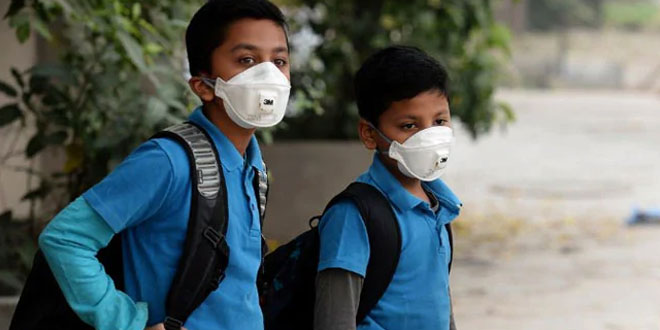New Delhi: “How many more studies confirming that the state of air in the country poses several serious health risks do our government and policy makers need before treating air pollution as a public health emergency? How many more deaths do the people of India need to witness before becoming mindful of their own actions that cause air pollution?” asks Dr. R. N. Bajpayi, a Physician and member of ‘Doctors for Air’, a group of doctors working on raising awareness on air pollution among people. Dr. Bajpayi said this while talking to NDTV on the adverse health impacts of air pollution on the occasion of World Health Day.
World Health Day is observed every year on April 7 to raise awareness about issues related to health worldwide. This time, with the theme – Universal Health Coverage: everyone, everywhere, the day focuses on raising awareness on universal access to healthcare and working towards such healthcare facilities that improve the health of people without putting much financial burden on them.
Also Read: World Health Day 2019: Five Stark Facts About Healthcare You Need To Know
Dr. Bajpayi says that high levels of pollutants from vehicular and industrial emissions, burning of coal and wood for cooking, construction dust and garbage burning have put the air quality of many cities across India in peril and have caused significant health hazards across the country adding to their health care expenditure.
According to the recently released State of Global Air report 2019, 1.2 million deaths occurred in India due to air pollution. Another study recently conducted by the International Institute for Applied Systems Analysis (IIASA) and the Council on Energy, Environment, and Water (CEEW) found that by 2030 more than 674 million Indian citizens are likely to breathe air with high concentrations of Particulate Matter (PM) 2.5 (measuring only 2.5 microns that are about 30 times smaller than a human hair and can lodge deep in the lungs), even if India was to comply with its existing pollution control policies and regulations.
As per Dr. Bajpayi, due to air pollution crisis, across the country, the number of patients suffering from the health impacts of air pollution has increased to a great extent in the last ten years. The major health impacts of air pollution include respiratory and cardiovascular diseases. Other health impacts include irritation in the eyes, nose, and throat, harm to the liver and blood, and damage to the nervous system and reproductive organs. Dr. Bajpayi says that due to air pollution, people suffer from psychological problems as well like fatigue, headaches, and anxiety.
He further asserts that pollution is not just limited to roads; it is also very much present in our homes. Similarly, it is not just the cities that suffer from air pollution, the air of rural areas has started becoming toxic as well. He says,
In the rural areas biofuel is still being used in many households which is affecting the people especially women in these areas the most.
Also Read: World Health Day: In Inefficient Management Of Waste Is A Cause of Deadly Diseases
Talking about the adverse impact of air pollution on children, a medical practitioner and founder of Care for Air, a non- governmental organisation dedicated to increasing awareness of air pollution, Dr. Gita Sinha said,
Right to breathe clean air is the basic right of the people. But many are deprived of this right from the very beginning of their life. Children are most at risks because of the alarmingly high levels of pollution that Delhi-NCR is facing. They are exposed to greater pollution levels relative to their body capacity. Their developing organs are more sensitive to toxins and toxins are retained in children’s bodies longer than adults.
How can you reduce the impact of air pollution on your health?
Doctors say that air pollution affects one’s health more than one can notice. Therefore, each person should try to alleviate the negative effects of atmospheric pollution on health, and not wait for falling sick before starting to take precautions. To make oneself less vulnerable to pollution, an individual must start with reducing their own pollution footprints by being more mindful of actions. Apart from this, it is important to avoid inhaling the toxic air directly with the help of a mask. Burning of bio-fuel, use of deodorant sprays and insecticides should be avoided. The burning of garbage should be stopped and various ways of managing the waste should be adopted, say the doctors.
Also Read: How Clean Water, Sanitation and Awareness About Hygiene Can Save Lives Of Children In India
NDTV – Dettol Banega Swachh India campaign lends support to the Government of India’s Swachh Bharat Mission (SBM). Helmed by Campaign Ambassador Amitabh Bachchan, the campaign aims to spread awareness about hygiene and sanitation, the importance of building toilets and making India open defecation free (ODF) by October 2019, a target set by Prime Minister Narendra Modi, when he launched Swachh Bharat Abhiyan in 2014. Over the years, the campaign has widened its scope to cover issues like air pollution, waste management, plastic ban, manual scavenging and menstrual hygiene. The campaign has also focused extensively on marine pollution, clean Ganga Project and rejuvenation of Yamuna, two of India’s major river bodies.






























